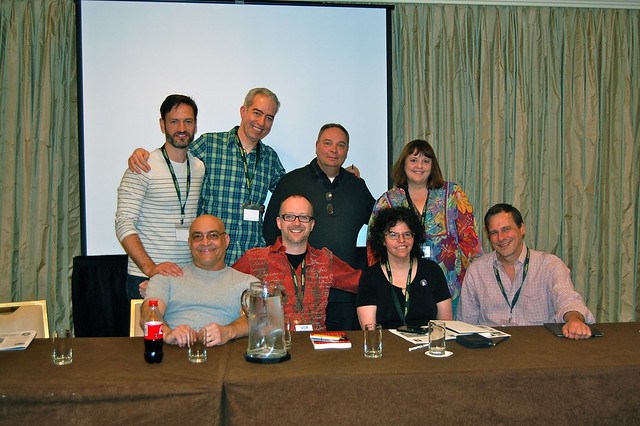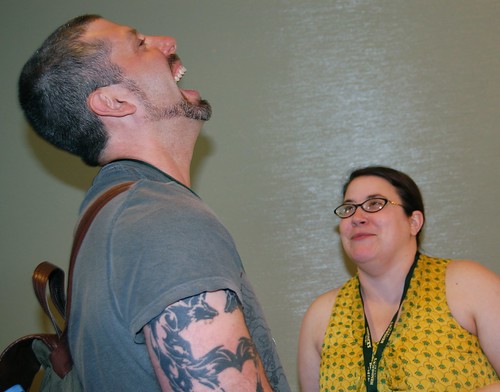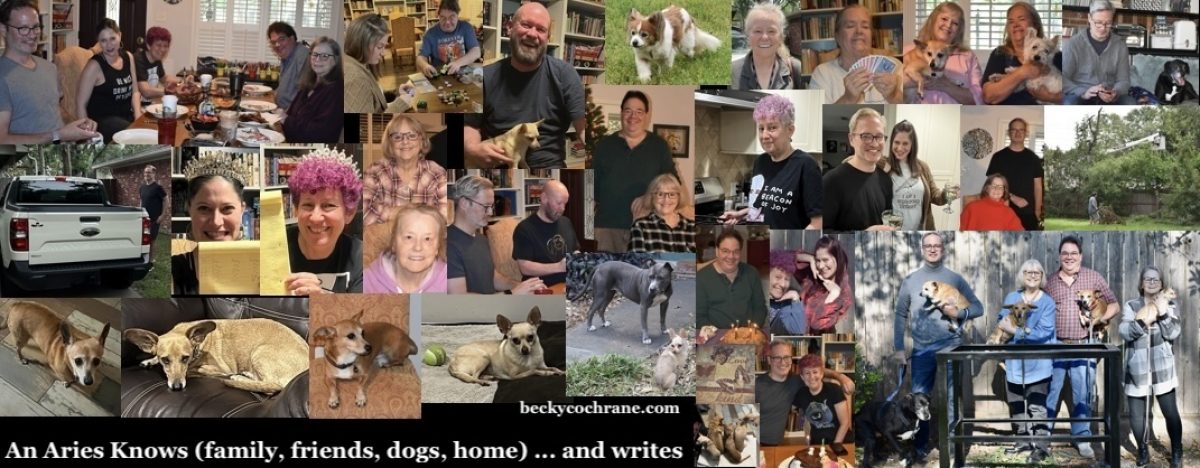Creative self-expression: Though conventional wisdom has it that writing is a solitary act, I tend to disagree. First, a writer’s life is full of interactions and observations that inspire the work and feed the muse. Second, once a writer engages any reader during the writing process, collaboration begins. And if the writer pursues being published, collaboration extends to editors, publicists, and booksellers.
When Timothy and I developed our Saints and Sinners panel “Your First Readers: How Editors Become a Positive Part of Your Short Story Process,” we were fortunate to be able to include contributors to Foolish Hearts and Best Gay Romance 2014 who were attending the festival.

standing: Timothy J. Lambert, David Puterbaugh, Jameson Currier, Becky Cochrane
We were also happy that two of the panelists, Jameson Currier and Greg Herren, could add their perspectives on both sides of the editor/writer relationship. Although we’d allowed time for the writers to read from their works, that didn’t happen, but they were able to offer specific examples from their stories of how they work with editors.
Here are a few bullet points from our discussion that might be of interest to writers hoping to be published.
- Read. Follow the guidelines in a Call for Submissions. When an editor is inundated with dozens, up to hundreds, of stories, from which s/he can choose only ten to fifteen for an anthology, your failure to follow submission guidelines makes it easy to reject your unread short story. If you don’t like the guidelines in a CFS–for example, you want to submit your story by mail, but the editor requests electronic submissions only–rather than get into a prolonged argument with the editor about why s/he’s wrong, perhaps a writer should reconsider whether a publication is the right place for her or his stories.Note the deadline. Note the correct address for sending your story. Note the word count. Note the editor’s name. Heeding whatever information is in the CFS and following through on it gives your story a much better chance of being read.
Also note the theme. Mystery? Romance? Erotica? Gay? Lesbian? Urban fantasy? Young adult? Paranormal? Christian? Trust me, no matter how good your story is, if it doesn’t fall within the theme the editor’s looking for, it can’t be accepted because it wouldn’t work with the other stories in a collection. Don’t waste an editor’s time by sending your story to everyone who issues a call for submissions without regard for the theme of a collection.
- Research. When Timothy and I get a story that we’re inclined to accept, we do an Internet search on the writer. Does he or she have a blog? Stories in other anthologies? Has the writer trashed other writers or editors he or she has worked with? Does the writer present a professional online presence or is he or she always convinced there is a cabal of publishers or readers who are actively conspiring to keep his or her greatness from the public? (Does that sound ridiculous? It happens!) Or when we’ve specifically stated that we want unpublished stories, and that we consider online availability of a story to mean published, and we then find the story archived on someone’s blog or LiveJournal or writer’s group, that’s an automatic rejection from us.Likewise, as a writer, you should do some research. Does the editor issuing the call have a good online record of promoting writers s/he’s worked with in the past? Does that editor seem to have the respect of others in the writing profession? Is the editor one of those people who believes there is a cabal of publishers and readers conspiring to keep his or her greatness from the public? (Still ridiculous; still happens.) What types of stories has the editor accepted in similar anthologies? You should write the stories you want to write, but you’ll have a better chance of getting them accepted by an editor who’s shown enthusiasm for stories like yours.
- Revise. Finally, before a writer submits a story with hope of publication, why, why won’t s/he find someone to do even the most rudimentary proofing job on it? If you’re poor, barter with someone! Babysit an English graduate student’s kid if s/he’ll agree to proofread your story. Cook someone a couple of meals in exchange for line edits. Or if you have money, negotiate fair payment for the level of editing your work requires.Although Jameson, Timothy, and I all admitted that there are writers we’re willing to take more time to edit because they’re just that good, those writers are usually ones with whom we already have some knowledge or an existing professional relationship, and we know that their stories are so good that it’s worth our time to deal with some of their writing flaws. If you’re new or unknown, especially if you’re unpublished, do everything you can to make sure your story is perfect before you submit it. It definitely increases your chances of getting your story read, and it’ll never be accepted if it’s not read.
Everyone on the panel had experience with a story or novel that was improved by editing. And this is why I think that long before your story reaches the public, it has gone through the collaborative process of beta readers, crit groups, friends willing to read and comment, and professional editors. Speaking as one editor, I can assure you that there is endless satisfaction in getting a good story, being able to make it a better story in even the smallest way, seeing it in print, and hearing a writer read it aloud as so many of our contributors are doing in their local bookstores, at conferences, and in classrooms.

Book reviewer Candice Huber was one of the people who attended our panel, and it was great to hear her insights on e-publishing. This is a field with which I have very little experience, other than as a reader. I have downloaded books, both free and that I paid for, that I won’t read beyond the first few pages because they are so full of flaws and bad writing. Chances are I’ll never give that writer another shot; there are too many good books I can read instead.
However, I can see value in putting your work online or making it available to download. When you want to share writing and get feedback, begin building a community of readers who will one day be willing to pay for your published work, or if you are a published writer who wants to maintain reader interest using short stories or novellas in the time between your published books, there are many ways to use the Internet. I reiterate what I always say about an online presence: You will be judged for how well you write, whether it’s in a blog, a contributing essay to a web site, or examples of your fiction. Be mindful of that, and be a professional, because the more readers your work finds, the more feedback and criticism you’ll get. Learn what you can from it, and strive to put your best work out there.
If you have any questions related to these topics, please ask in comments. And if you were at the panel and remember things I forgot, please add those in comments, too!
ETA: It took me about two hours to write this post. I just counted my edits to it: 42 43.

There is so much good information here. And the photos of all those lovely people make me so happy.
Thank you! You were among those lovely people in spirit, if not in the photo. =)
I wish I had seen this before I submitted my story. However, I did seek out advice from David P. and ‘Nathan and had Marika and Chris, as well as a woman I work with and trust to tell me the truth, read it for me prior to submitting.
That’s great! Hope you get lots of support and keep perfecting your writing.
Great panel, great recap! So late in the day, my note-taking was minimal. But I did like N.S. Beranek’s idea of keeping a list of “Grammer Rules I Had to Look Up.”
That list was a good idea! Writers can always teach us something new and helpful.
It was nice looking out and seeing that you were there and interested. Thanks for joining us!
Oh, bless you for noting that it took two hours and 43 edits to produce this post. I thought there was something wrong with me for spending similar amounts of time on posts and emails.
While I’m on the subject, what the heck is Twitter’s problem? Hello? An “edit post” button, please. I am so sick of this scenario: “How many characters do I have left? Can I say this in one post? Yes! Whew.” Click. “Doh!”
This is the only thing I will grudgingly admit that FB has done right–enabling us to edit our posts and comments. It took them years, so maybe one day Twitter will give in.
I HATE seeing an error in my Tweets. Though I delete them and rewrite them, the bad ones will stay on someone’s feed until they sign out or refresh. It makes me twitch.
Fantastic.
Do you mind if I print off this one entry so I can read it later and give it the due care and attention it deserves?
Of course I don’t mind. I’m glad it’s giving you things to think about!
Thanks Becky. I think it will prove really helpful.
I just looked up flights to NOLA for next year and the cheapest is £845 ($1,415) – so I think it will be a few years before I get there! Your summaries of what happened and was said is as near to S&S as I can get. It’s greatly appreciated.
Having just read bullet point 2 (Research) I am now worried about what I have written in my blog!
As a point of interest, do you ever reject authors you know in favour of an author previously unknown to you?
I don’t think you have to worry. And your blog is private, in any case.
Yes, we have definitely sent rejections to authors we know and accepted stories from writers unknown to us.
Do you find that difficult? Or has anyone got the hump because of it?
It’s never easy to reject a story, but definitely our writer friends are professionals. It doesn’t pay a writer to be thin-skinned, because there will always be rejections. I’ve been rejected by one of my favorite editors multiple times. I still have nothing but admiration and affection for him as a person and an editor.
Usually I come back from S&S with all kinds of ideas I want to share in my blog because of what panels I went to. Though I really enjoyed the panels this year, things seem to need to percolate in my brain longer.
Such a wonderful time. Love the post, and I adore that photograph.
Thank you.
Each festival offers me a different experience. This year, I feel like I absorbed less from panels than I did from social engagements. That’s not a bad thing and is no reflection whatsoever on the panels. I think I just didn’t attend enough of them, because the ones I went to all offered me something new to consider and learn from.
But I also felt that I drew so much from new contacts, old friends, and lots of conversations. It was good.
There were panels? I thought it was one big social engagement.
Maybe that’s what I’ve been doing wrong…
I thought you came to NOLA each year to add to Tim’s corkscrew collection!
Where are your S&S reports, ‘Nathan?!
I haven’t written anything up yet, and that makes me a bad guy. I think this year I went to more panels than ever before – and then getting home was a nightmare, work struck at full tilt, and now I’m in an airport again. Basically, I have no excuse, and I should at least pen some thank yous.
Really wonderful tips on collaborating with editors when submitting a ms. I’m sure it was an exciting panel discussion, too. I’ll be sharing this info on FB with all my writer/editor friends. Thank you.
Thank you so very much!